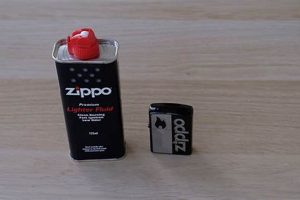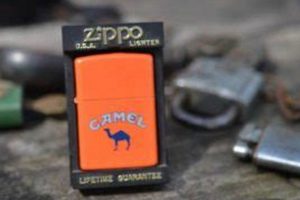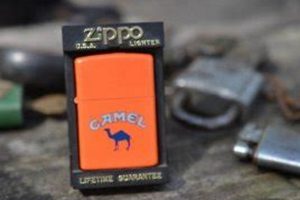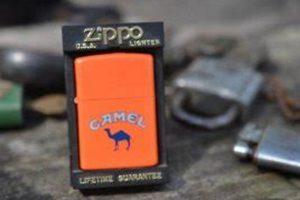Zippo Manufacturing Company maintains its headquarters and primary production facility in Bradford, Pennsylvania, where it was founded in 1932. The iconic windproof lighters continue to be manufactured there, utilizing many of the same techniques developed over the company’s long history. This commitment to local production has become a defining characteristic of the brand.
Maintaining manufacturing in Bradford has significant economic and cultural implications. It provides employment opportunities for the local community and contributes to the region’s economic stability. Furthermore, the factory represents a tangible link to American manufacturing heritage and the company’s enduring legacy. This connection to place reinforces the brand’s image and fosters a sense of authenticity valued by customers worldwide.
This enduring presence in Bradford allows for deeper exploration into topics such as the company’s history, manufacturing processes, impact on the local economy, and the cultural significance of the Zippo lighter.
Tips for Purchasing and Maintaining a Zippo Lighter
Authentic Zippo lighters offer a lifetime guarantee and dependable performance. The following tips can assist consumers in making informed purchasing decisions and ensuring long-term functionality.
Tip 1: Verify Authenticity. Genuine Zippo lighters possess distinct markings, including a bottom stamp indicating the date and location of manufacture. Counterfeit lighters often lack these details or display inconsistencies.
Tip 2: Choose the Right Fuel. Zippo premium lighter fluid is specifically formulated for optimal performance and longevity. Avoid generic lighter fluids, which can damage the wick and internal mechanisms.
Tip 3: Replace Flints Regularly. A worn flint can lead to ignition failures. Replacements are readily available and easy to install.
Tip 4: Maintain the Wick. Trim the wick if it becomes excessively charred or produces a weak flame. Ensure the wick is properly inserted into the rayon balls within the lighter’s insert.
Tip 5: Protect the Finish. Handle the lighter with care to avoid scratching or damaging the finish. Various finishes are available, requiring different cleaning and maintenance approaches.
Tip 6: Utilize the Lifetime Guarantee. If a genuine Zippo lighter malfunctions, regardless of age or condition (excluding finishes), the manufacturer will repair or replace it free of charge.
Tip 7: Consider Collectible Editions. Zippo releases limited-edition lighters commemorating various themes and events. These can appreciate in value and become cherished collector’s items.
By adhering to these guidelines, owners can ensure their Zippo lighters provide years of reliable service and potentially become treasured possessions passed down through generations.
These practical tips, combined with an understanding of the history and craftsmanship behind each Zippo lighter, enhance the overall ownership experience.
1. Local Production
Local production forms the bedrock of Zippo’s identity and its continued presence in Bradford, Pennsylvania. The decision to maintain manufacturing operations in its original location has profound implications, directly addressing the question of ongoing production in Bradford. This commitment fosters a strong connection between the product, the company, and the community. It allows Zippo to retain control over quality, craftsmanship, and the entire manufacturing process, ensuring adherence to its established standards. Examples include the specialized machinery and skilled workforce unique to the Bradford facility, contributing to the lighter’s distinct character. By producing locally, Zippo cultivates a sense of place and heritage, becoming integral to the local economy and its history.
The emphasis on local production has enabled Zippo to build a loyal customer base that values the brand’s authenticity and “Made in America” ethos. This commitment resonates particularly strongly in a market increasingly dominated by globalized manufacturing. The Bradford factory serves as a tangible symbol of this commitment, showcasing the companys dedication to its workforce and the community. This approach also facilitates tighter integration between design, production, and distribution, enabling greater responsiveness to market demands and fostering innovation.
Sustaining local production in Bradford represents more than just a business strategy; it signifies a commitment to a legacy. This strategy reinforces the brand’s values, provides economic stability to the region, and ensures the continued production of the iconic Zippo lighter in its birthplace. While challenges such as global competition and evolving economic landscapes exist, Zippo’s dedication to local production remains a core element of its identity and a testament to its enduring relationship with Bradford, Pennsylvania.
2. Skilled Workforce
The continued production of Zippo lighters in Bradford, Pennsylvania, relies heavily on a skilled workforce. Generations of craftspeople have honed specialized skills specific to the manufacturing processes involved, creating a deep reservoir of expertise within the local community. This institutional knowledge, passed down through apprenticeships and on-the-job training, ensures the quality and consistency that define the Zippo brand. The intricate assembly, the precise application of finishes, and the meticulous quality control procedures all demand a high level of dexterity and experience. For example, the iconic “click” of a Zippo lighter, a hallmark of its design, requires precise adjustment by skilled handsa skill developed over years of experience.
This skilled workforce represents a significant investment for Zippo Manufacturing Company and a crucial asset for the Bradford community. The company’s commitment to training and retaining its workforce contributes to the region’s economic stability and fosters a sense of pride in local craftsmanship. Furthermore, the specialized skills possessed by these workers are difficult to replicate elsewhere, reinforcing the importance of Bradford as the manufacturing hub for Zippo lighters. This concentration of expertise allows for continuous improvement of manufacturing techniques, adaptation to new designs, and the maintenance of quality standards essential to the brand’s global reputation.
The presence of a skilled workforce in Bradford is intrinsically linked to the continued production of Zippo lighters. It represents a key factor in the company’s success and its enduring connection to the community. Maintaining this specialized workforce requires ongoing investment in training and development programs, ensuring that the skills and knowledge necessary for producing these iconic lighters remain within the local community for future generations. This, in turn, reinforces the long-term viability of Zippo’s manufacturing operations in Bradford and contributes to the enduring legacy of the brand.
3. Factory Tours
Factory tours at the Zippo manufacturing facility in Bradford, Pennsylvania, provide a direct answer to the question of ongoing lighter production. These tours offer firsthand observation of the manufacturing process, confirming the continued operation and local production of Zippo lighters. They provide a unique opportunity to understand the brand’s commitment to its heritage and the skilled craftsmanship involved in creating each lighter.
- Witnessing Production
Visitors observe the various stages of lighter production, from component fabrication to final assembly and quality control. This direct observation demonstrates the active and ongoing nature of manufacturing in Bradford. Seeing the intricate machinery and skilled workers in action reinforces the complexity and precision involved in creating each Zippo lighter. The sights and sounds of the factory floor provide tangible evidence of continued production.
- Understanding Craftsmanship
Factory tours highlight the role of skilled craftspeople in the manufacturing process. Visitors gain insights into the specialized techniques and expertise required for various tasks, such as case finishing, wick insertion, and flint replacement. Observing these processes underscores the importance of a skilled workforce in maintaining the quality and consistency for which Zippo is known. For instance, witnessing the hand-finishing process demonstrates the level of detail and care invested in each lighter.
- Connecting with History
The tours emphasize the historical significance of Zippo’s presence in Bradford. Displays and exhibits often showcase vintage lighters, historical artifacts, and company milestones, connecting the current production with the brand’s rich heritage. This historical context emphasizes the long-term commitment to local manufacturing and the evolution of the lighter’s design over time. The museum aspect of the tour allows visitors to appreciate the legacy of Zippo within the community.
- Confirming Authenticity
Experiencing the factory firsthand confirms the authenticity of Zippo lighters produced in Bradford. This is particularly relevant in a market where counterfeit products exist. Witnessing the actual production process provides assurance to consumers that their purchase supports the genuine article, made with quality materials and skilled labor in the original factory. This direct connection to the source builds trust and reinforces the brand’s reputation for quality and craftsmanship.
Factory tours serve as a powerful demonstration of Zippo’s continued manufacturing presence in Bradford. They provide a transparent view into the production process, highlighting the skilled workforce, historical significance, and authenticity of the iconic lighter. This direct engagement with the manufacturing process reinforces the answer to the question, “Do they still make Zippo lighters in Bradford, Pennsylvania?”, with a resounding affirmation.
4. Economic Impact
The continued manufacturing of Zippo lighters in Bradford, Pennsylvania, has a significant economic impact on the region, directly answering the frequently asked question about ongoing production. Understanding this impact requires examining various facets of the company’s operations and its relationship with the local community.
- Employment
Zippo Manufacturing Company represents a substantial employer in Bradford, providing jobs for hundreds of individuals in a variety of roles, from production line workers to administrative staff. These jobs offer stable employment opportunities and contribute to the overall economic well-being of the community. The consistent demand for Zippo lighters globally translates into consistent employment locally. This contrasts with industries subject to greater economic fluctuations. Furthermore, the specialized skills required for lighter manufacturing often lead to higher wages and long-term career paths.
- Supply Chain
Zippo’s operations support a network of local suppliers and businesses. The company sources materials and services from within the region, creating a ripple effect throughout the local economy. This reliance on local suppliers strengthens the economic interdependence within the community and helps sustain other businesses. For example, local metal fabrication companies benefit from providing raw materials, while packaging and shipping companies also receive sustained business from Zippo’s ongoing operations.
- Tourism
The Zippo/Case Museum and factory tours attract visitors to Bradford, contributing to the local tourism industry. These visitors spend money on accommodations, dining, and other local businesses, generating revenue and supporting jobs within the hospitality sector. The museum itself stands as a testament to the company’s history and its close ties to the community, further solidifying its role in the local economy. The continued operation of the factory enables these tours, directly linking tourism revenue to ongoing lighter production.
- Tax Revenue
Zippo’s operations generate significant tax revenue for the local government, supporting essential public services such as schools, infrastructure, and emergency services. This revenue stream contributes to the overall financial stability of the community and its ability to invest in public projects. The company’s long-term presence in Bradford provides a consistent and reliable source of tax revenue, which is crucial for planning and maintaining essential services.
These combined economic factors demonstrate the vital role Zippo Manufacturing Company plays in Bradford’s economy. The continued production of lighters in the city sustains jobs, supports local businesses, attracts tourism, and generates crucial tax revenue. This economic impact underscores the importance of the ongoing manufacturing operation in Bradford and its connection to the overall well-being of the community. It provides a compelling economic rationale for the affirmative answer to the question of whether Zippo lighters are still made in Bradford.
5. American Manufacturing
The continued production of Zippo lighters in Bradford, Pennsylvania, represents a significant case study in American manufacturing. This commitment to domestic production has become a defining characteristic of the brand, deeply entwined with its identity and customer perception. Several factors contribute to the significance of this “Made in America” aspect.
Maintaining domestic production allows Zippo to control quality, ensuring adherence to its rigorous standards. The skilled workforce in Bradford possesses specialized knowledge and expertise accumulated over generations, contributing to the lighter’s consistent quality and performance. This focus on quality has become synonymous with American manufacturing, reinforcing the brand’s reputation for reliability and durability. For example, the lifetime guarantee offered with every Zippo lighter underscores this commitment to quality and reinforces customer trust in American-made products.
Furthermore, “Made in America” carries cultural weight, evoking notions of heritage, craftsmanship, and a connection to a specific place. Consumers often associate American-made goods with quality and durability. This cultural association resonates particularly strongly with certain demographics and contributes to the brand’s appeal. In a globalized marketplace, where manufacturing often shifts to lower-cost regions, Zippo’s commitment to American manufacturing stands out as a differentiating factor. This commitment also contributes to a sense of national pride and supports the domestic economy.
However, maintaining American manufacturing presents challenges. Labor costs in the United States are typically higher than in many other countries. This requires Zippo to focus on efficiency and innovation to remain competitive. Additionally, global supply chain disruptions can impact production. Despite these challenges, Zippo continues to invest in its Bradford facility, demonstrating a long-term commitment to American manufacturing, its workforce, and the local community. This commitment contributes not only to the company’s bottom line but also to the broader narrative of American manufacturing and its enduring relevance in a globalized world. The practical significance of this understanding lies in the recognition of the multiple factorseconomic, cultural, and historicalthat contribute to the continued success of Zippo as an American-made product.
6. Brand Heritage
Brand heritage plays a crucial role in the enduring appeal of Zippo lighters. The fact that these lighters continue to be manufactured in Bradford, Pennsylvania, where the company was founded, is intrinsically linked to this heritage. This connection to place and history contributes significantly to the brand’s authenticity and perceived value. Understanding this link requires exploration of several key facets of Zippo’s brand heritage.
- Founding Story and Values
The story of Zippo’s founding in 1932, rooted in the desire to create a reliable and durable lighter, resonates with consumers. This origin story, combined with the company’s commitment to quality and lifetime guarantee, forms the foundation of its brand heritage. The continued presence in Bradford reinforces this narrative, providing a tangible link to the company’s origins and the values upon which it was built. This connection strengthens consumer trust and fosters brand loyalty.
- Cultural Significance
Zippo lighters have become embedded in popular culture, appearing in films, television shows, and music. This cultural presence, combined with the lighter’s association with historical events like World War II, contributes to its enduring appeal. The continued production in Bradford reinforces this cultural significance, linking the product to a specific place and time. This historical and cultural context adds depth and meaning to the brand, differentiating it from competitors.
- Craftsmanship and Quality
Zippo’s reputation for quality and craftsmanship is central to its brand heritage. The skilled workforce in Bradford, many of whom represent generations of Zippo employees, maintains the high standards of production associated with the brand. This commitment to quality, combined with the “Made in America” ethos, reinforces the brand’s heritage and justifies its premium pricing. The continued reliance on skilled labor in Bradford serves as a tangible expression of this commitment.
- Collectibility and Community
The collectibility of Zippo lighters contributes significantly to brand heritage. Limited edition releases, commemorative designs, and the ability to personalize lighters foster a sense of community among collectors. The continued production in Bradford, Pennsylvania, ensures the authenticity and value of these collectibles. The factory and museum serve as pilgrimage sites for enthusiasts, further strengthening the connection between the brand, its heritage, and its loyal customer base.
These interwoven facets of Zippo’s brand heritage are inextricably linked to the continued manufacturing presence in Bradford. This connection to place, history, and craftsmanship reinforces the brand’s authenticity, differentiates it in a competitive market, and fosters a loyal customer base. The ongoing production in Bradford is not merely a logistical decision; it is a strategic imperative that sustains and strengthens the very essence of the Zippo brand.
Frequently Asked Questions
This section addresses common inquiries regarding the manufacturing of Zippo lighters, specifically focusing on the company’s operations in Bradford, Pennsylvania.
Question 1: Are all Zippo lighters manufactured in Bradford, Pennsylvania?
Yes, Zippo Manufacturing Company’s primary production facility remains in Bradford, Pennsylvania, where the company was founded. While some components may be sourced globally, final assembly and quality control occur in Bradford, ensuring each lighter adheres to the company’s stringent standards.
Question 2: Does Zippo outsource any of its manufacturing processes?
While certain components, such as raw materials, may be sourced from external suppliers, the core manufacturing processes, including assembly, finishing, and quality control, remain in-house at the Bradford facility. This allows Zippo to maintain control over critical aspects of production and uphold its quality standards.
Question 3: How has Zippo maintained its manufacturing presence in Bradford for so long?
Several factors contribute to Zippo’s enduring presence in Bradford. These include a skilled local workforce, a commitment to American manufacturing, and the strategic importance of maintaining a connection to the brand’s heritage and history.
Question 4: What is the economic impact of Zippo’s operations in Bradford?
Zippo’s presence in Bradford provides significant economic benefits, including job creation, support for local businesses through its supply chain, and contributions to the local tourism industry via the Zippo/Case Museum and factory tours.
Question 5: Are there any plans to relocate Zippo’s manufacturing operations?
Zippo Manufacturing Company remains committed to its operations in Bradford, Pennsylvania. The company’s history, its skilled workforce, and the brand’s association with the city are integral to its identity.
Question 6: How can consumers verify that their Zippo lighter was manufactured in Bradford?
Genuine Zippo lighters feature bottom stamps indicating the date and location of manufacture. Consumers can verify authenticity through these markings and by purchasing from authorized retailers.
Maintaining production in Bradford remains central to Zippo’s identity, ensuring quality control, supporting the local economy, and preserving the brand’s heritage. The company’s ongoing commitment to American manufacturing and its skilled workforce underscores the enduring connection between Zippo and Bradford, Pennsylvania.
For further insights into Zippo’s history, manufacturing processes, and product offerings, explore additional resources available online and at the Zippo/Case Museum.
Zippo Lighters and Bradford, Pennsylvania
Examination reveals a definitive answer: Zippo lighters continue to be manufactured in Bradford, Pennsylvania. This sustained presence signifies more than just a geographical location; it represents a commitment to American manufacturing, a skilled workforce, and a rich brand heritage. The factory’s operations contribute significantly to the local economy, providing employment and supporting related industries. Furthermore, the ability to witness the manufacturing process through factory tours offers tangible proof of ongoing production and provides valuable insight into the craftsmanship behind each lighter. The enduring connection between Zippo and Bradford underscores the importance of local production, skilled labor, and brand heritage in a globalized marketplace.
Zippo’s commitment to its birthplace represents a compelling example of the enduring power of place and heritage in a globalized economy. This dedication to local production, combined with a focus on quality and craftsmanship, positions the company for continued success. As consumers seek authenticity and enduring value, the story of Zippo lighters and Bradford, Pennsylvania, serves as a reminder of the significance of maintaining manufacturing roots and investing in local communities.







